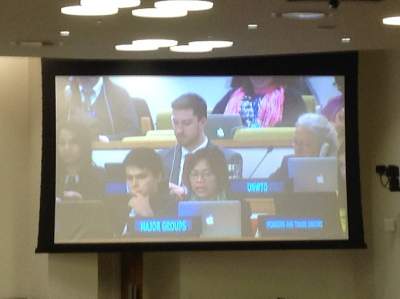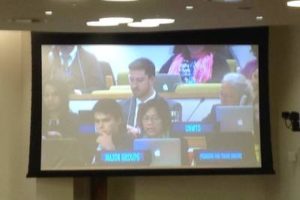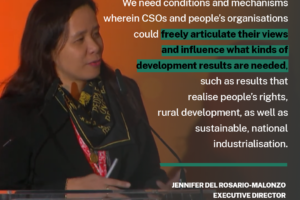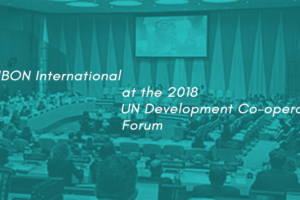Full Text:
Tenth Session of the Open Working Group on Sustainable Development Goals
March 31-April 4, 2014
FOCUS AREA 15: CLIMATE
Thank you, Mr. Co- chair.
I am Maria Theresa Nera-Lauron of Ibon and the Campaign for Peoples’ Goals, speaking on behalf of the Women and NGO Major Group, Feminist Task Force, Mining Working Group and international networks such as Campaign for People’s Goals and Beyond 2015.
[[{“type”:”media”,”view_mode”:”media_large”,”fid”:”340″,”attributes”:{“alt”:””,”class”:”media-image”,”height”:”299″,”style”:”color: rgb(0, 0, 0); font-family: Verdana, Arial, Helvetica, sans-serif; font-size: 10px; text-align: center; width: 350px; height: 262px; margin: 5px; float: right;”,”typeof”:”foaf:Image”,”width”:”400″}}]]
We welcome a distinct focus area on climate change and appreciate that a good number of member States have articulated their regard for climate change as a development challenge that needs to be effectively addressed and integrated across the post-2015 development agenda to ensure it remains a high priority on the public and political agenda. We likewise commend member States’ mention of the need to uphold the principle of ‘common but differentiated responsibilities’ (CBDR) as agreed upon in 1992.
But the urgency is still missing. Climate change is a threat to poverty eradication and sustainable development – the aims of post-2015 development – as well as to universal human rights, the integrity of ecosystems, and it is a cross-cutting development issue already negatively impacting complex global systems, including food systems as recognized in the 5th report of the Intergovernmental Panel on Climate Change (IPCC). We reiterate the recent CSW58 Agreed Conclusions that recognised that women and girls are disproportionately affected by the impacts of climate change, including “desertification, deforestation and natural disasters, persistent drought, extreme weather events, sea-level rise, coastal erosion and ocean acidification”.
In addition to having a separate climate change goal/Climate change cannot be ignored, there is a need to integrate climate change and environmental sustainability into all focus areas. Industrialization, infrastructure, means of implementation and economic growth, have the potential to contribute to further climate change unless they incorporate actions to mitigate and adapt to the impacts of climate change, remain within planetary boundaries and aim for sustainable economic development, rather than remaining obsessed with sustained economic growth.
Equity and ambition are the twin imperatives that should guide the development of goals, targets and indicators to stop climate change. Aside from exacerbating poverty and magnifying inequalities between countries, societies, and between women and men, climate change poses an existential threat to people, communities and countries.
While climate change is a global problem and we are all responsible, countries and communities have differentiated responsibilities based on historical emissions, capabilities, and potential for action. Developed countries should also provide finance and technology to those already suffering from the impacts of climate change. Therefore, there is a need to phase-out net greenhouse gas emissions as soon as possible.
We call for the following targets in the SDG framework:
Greenhouse gas (GHG) emissions peak before 2020 and then rapidly decline to achieve zero carbon emission around the middle of the century through gender-responsive, socially just and environmentally sound national actions that take into account equity between countries, generations and women and men;
Urgently phase out economic activities incompatible with planetary boundaries and ensure there is adequate redress of damage based on the ‘polluter pays’ principle;
Ensure full actualization and disbursement of adequate, appropriate and new climate finance through effective means of implementation and ensuring gender-sensitive social and environmental safeguards, to support developing countries mitigation and adaptation to already incurred impacts to global warming in addition to loss and damage;
We also strongly recommend amendments to build on the targets in the revised Chair’s text on the 19 focus areas:
Amend target (b) to read: All countries have the means and strategies in place to build their adaptive capacity and resilience, especially of poor and marginalized groups.
Regarding target (c), we are deeply concerned about ‘introducing economic incentives for low carbon solutions’ as this means corporations and big business profiting even more from promoting ‘climate smart’ solutions. There is a need to ensure that safe, environmentally sound, appropriate, gender-responsive, technologies which support a transition from a carbon intensive society are accessible particularly to the most marginalized communities and societies, and unhindered in their full utilization by intellectual property rights (IPR) or international trade agreements.
Reformulate target (d) to read: All countries have developed low-carbon, climate-resilient and gender-responsive sustainable development strategies and plans.
Expand target (e) to read: All countries have reduced the damage caused by natural and climate-related natural disasters and slow-onset climate events through gender-responsive disaster risk reduction that ensures participation of marginalized and affected communities in all stages of policy development and project planning to ensure that differentiated needs are taken into account, that diverse perspectives inform decision-making and that solutions are sustainable;
Expand target (f) to read: All countries have developed comprehensive, ecosystem-based climate change education and awareness-raising on mitigation, adaptation, resilience and disaster response strategies. This should promote civic participation, and contribute to upholding the rights, needs, knowledge and roles especially of women and Indigenous Peoples.
The world cannot afford for its leaders to be conservative (in vision) nor stingy (in commitment). We urge for the member States to be visionary and transformative and steer the world to a new pathway to solve climate change.
We cannot afford anything less.
Thank you.



